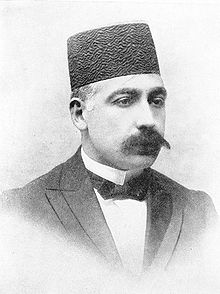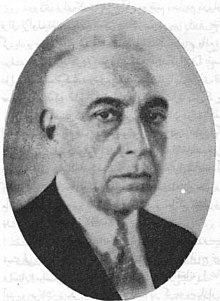Hassan Vosough
Hassan Vosough (Vosough al Dowleh) ( Persian حسن وثوق; * 1868 ; † 1951 in Tehran ), also Hassan Vosouq , was an Iranian politician. He was a member of the founding assembly of the first Iranian parliament and its deputy speaker. In various cabinets he took over the post of finance minister, education minister, justice minister, interior minister and foreign minister. Hassan Vosough was Prime Minister of Iran twice. Hassan Vosough had eight daughters and two sons. Hassan Vosough was the older brother of Ahmad Qavam .
Life
Hassan Vosough comes from one of the most famous families in Iran. His father was Ebrahim Mirza Motamed al Saltaneh and his grandfather was Mohammad Qavam al Dowleh. His ancestors served the Qajar Shahs as government officials. Three prime ministers came from his father's family: Hassan Mostofi , Ahmad Matin-Daftari and Mohammad Mossadegh . His mother's family provided a prime minister: Mirza Ali Khan Amin al Dowleh .
Hassan Vosough grew up with his uncle Mirza Ali Khan because his mother died at an early age and his father was a financial administrator in several provinces of Iran. Hassan received good training from private tutors and was fluent in French and English. As an adolescent he accompanied his father on his travels and took over the financial administration of Azerbaijan at a young age .
Hassan Vosough took an active part in the constitutional revolution and was elected deputy speaker of parliament in 1906 as a founding member of the constituent session of the first parliament. From 1911 to 1915, Hassan Vosough was first foreign minister and later finance minister of Iran. He assumed the office of prime minister for the first time from August 1916 to May 1917. After the abdication of the Russian tsar on March 15, 1917, hopes for an end to World War I and a withdrawal of Russian and British troops in November 1914 invaded Iran and occupied the country since that time. Hassan Vosough organized the fourth parliamentary elections in the history of the fledgling constitutional monarchy of Iran, but then had to resign because of the ongoing nationalist agitation and terrorist activities of an anti-British "penal committee".
Hassan Vosough would later become Prime Minister again from August 1918 to June 1920. During this time he played a leading role in the negotiations with the British ambassador that led to the Anglo-Iranian treaty of 1919 . Domestic disputes over this treaty, which, in the opinion of political opponents, would transform Vosough's Iran into a British protectorate, led to his resignation as Prime Minister. When it later became known that Vosough had asked the British for 500,000 tomans to sign the contract and had personally received 200,000 tomans, his political career was initially over. Although Vosough denied having personally enriched himself and also offered to repay the 200,000 tomans, his reputation was so damaged that he left Iran. He did not return to Iran until 1926 after part of the bribe was returned to the Iranian state.
Under Reza Shah he took over the office of finance minister again in June 1926 and later he became minister of justice. In November 1926, he resigned his office as minister because he had applied for a seat in parliament and was also elected. After the seventh session of the Iranian parliament in 1928, Vosough withdrew from politics. He was often consulted by Reza Shah on financial matters. In 1936 he became a member of the newly founded Academy for Persian Language and Literature ( Farhangestan ).
Hassan Vosough died in Tehran in 1951.
literature
- Cyrus Ghani: Iran and the Rise of Reza Shah. From Qajar collapse to Pahlavi Rule. IB Tauris Publishers, London et al. 2000, ISBN 1-86064-629-8 , p. 16.
See also
Individual evidence
- ^ Rouhollah K. Ramazani: The foreign policy of Iran. A Developing Nation in World Affairs. 1500-1941. University Press of Virginia, Charlottesville VA 1966, p. 147.
- ^ Cyrus Ghani: Iran and the Rise of Reza Shah. 2000, p. 54.
| personal data | |
|---|---|
| SURNAME | Vosough, Hassan |
| ALTERNATIVE NAMES | Vosough al Dowleh |
| BRIEF DESCRIPTION | Minister, Prime Minister of Iran |
| DATE OF BIRTH | 1868 |
| DATE OF DEATH | 1951 |
| Place of death | Tehran |

